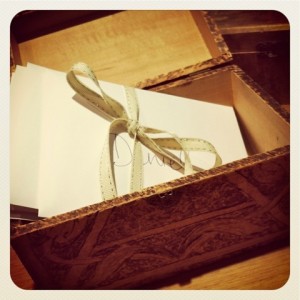by Lisa M. Wolfson
As I get older, and especially after surviving cancer, I’ve decided it’s vitally important that I leave some kind of guide for my teenage son. I want to share with him my inner thoughts, my memories and stories, and my hopes for him and his future. These desires have lead me to explore legacy writing, the act of documenting your experiences and values through letters that are kept sealed until the reading of your last will and testament. The whole idea struck me as a wonderful gift, to both my family and myself, linking me to my own history, giving purpose to my life and helping to preserve family traditions after I’m gone.
Legacy letters can convey almost anything, from values to past experiences to hopes and dreams. They can pass on who we are and what we hold dear. They can be written to family, friends, even colleagues. They nourish the future, fill gaps in the past, and connect generations, providing insight into who we are and who we hope our children will be. Legacy letters can be in the form of blessings or stories, but shouldn’t be written as admonitions or instructions. For example, rather than insisting your son believe in himself, you can write a blessing, something along the lines of “May you always be blessed with wisdom and a true belief in yourself,” and it will be far more effective than judgments or commands.
In her book, Women’s Lives, Women’s Legacies, Rachael Freed provides the following “Principles of Practice” for legacy writing:
- Use the format of a letter. In this day of swiftly deleted emails and the corrupted spelling of text messaging, there is something special, even sacred about receiving a letter in a loved one’s own hand.
- Time yourself and write for 15 minutes, and no more. Most writers find that the discipline of brief timed writing almost always results in surprising and profound expression directly from the heart, a powerful message to your loved one.
- Write your reflections for no more than 5 minutes directly after writing a legacy letter and keep them with a copy of your letter in a personal file. They provide you with a different perspective about the experience of writing a legacy letter . . . an invaluable reflection for its opportunity to learn more about yourself and the values that matter most to you.
When I began writing to my son, I experienced a variety of emotions, ranging from joy to pride to tearful sadness. Memories I had not recalled for years came rushing back to me. Family traditions I grew up with, traditions that have since been taken lightly, suddenly had renewed meaning for me, and the fear of their being lost forever created a powerful desire to preserve them and pass them on to my son.
Some of the letters I have written to my son include the unforgettable memory of my mother, when she was dying, requesting a trip to the flea market. I still have the pocketbook and makeup she bought that day. I also wrote to my son about the first time I met my husband at Club Med in Martinique, on the very last night of the vacation. But my favorite letter is one in which I share my admiration for my son and take note of the differences between us. It begins: “You, my beautiful child, amaze me. You are fearless in the greatest sense of the word. So unlike me at your age . . . .” I go on to offer him a blessing for his future, but the rest is private, for his eyes only.
Although I started legacy writing as a gift to my child, I am amazed at how much personal joy and revelation I have experienced in the process. It feels like a renewal of my values. Old memories have come to the surface, bringing tears of joy and sorrow. Legacy writing is helping me remember what I value most, and giving me the opportunity to let my child know me beyond the person I am today. I hope he can understand what shaped my life, who I was before being his mother, and the core of what I’ve experienced in my life.
Pick up a pen and start writing! May your legacy writing be a rewarding gift to yourself and to all those it reaches tomorrow.
Lisa Wolfson lives in Rockville Centre, New York, and volunteers at You Can Thrive!, an organization that provides free and low-cost support services for breast cancer survivors.







What a wonderful idea, Lisa. I have long thought about writing our family history (or at least MY version of it!) for my kids and nieces and nephew, but the task has always seemed overwhelming. You offer a manageable way of accomplishing this – one that is also a beautiful gift. Thank you for sharing your idea.